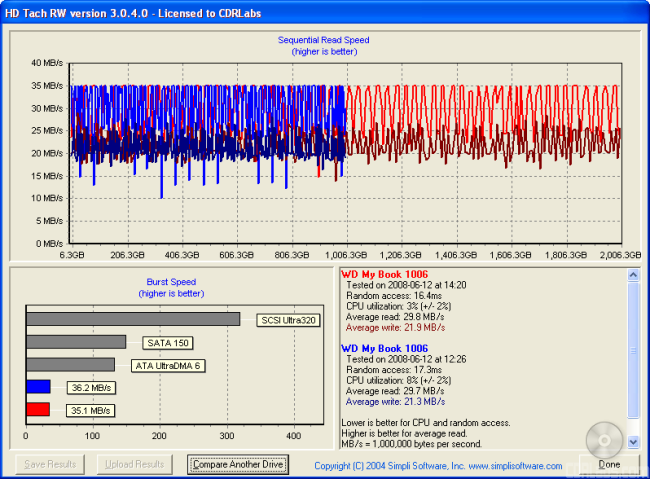The test system used in this review was a Dell OptiPlex 755. The computer came equipped with an Intel Core 2 Duo E6750 2.66GHz CPU, 2GB of DDR2 800MHz memory, a Western Digital WD800JD 80GB SATA hard drive and an ATI Radeon HD 2400XT 256MB video card. For the operating system, I installed a fresh copy of Windows XP with Service Pack 3.
To test the performance of the Western Digital My Passport Elite, I ran a series of benchmarks using HD Tach RW 3.0.4.0, SiSoftware Sandra Professional Business XII.SP2c and ATTO Disk Benchmark 2.02. To get a feel for the "real world" performance, I also copied and pasted 30GB of random files and directories in Windows Explorer.
HD Tach RW 3.0.4.0:
Using HD Tach, we can benchmark a drive's read, write and burst speeds as well as its seek times and CPU usage. Looking at the screenshot above, you can see how well the My Book Mirror Edition performed when using RAID 0 (red) and RAID 1 (blue). While the difference was small, the system was faster when using RAID 0.
SiSoftware Sandra - File System and Physical Disk Benchmarks:
While I am not a big fan of SiSoftware Sandra's optical drive benchmarks, it is a great tool if you want to test a system's performance quickly and easily. One of Sandra's more useful tests is the File System benchmark. This benchmark gives each drive an overall score, or "Drive Index," based on the results of its read and write tests.
| My Book Mirror RAID 1 |
My Book Mirror RAID 0 |
|
| Drive Index: | 28.31 MB/s | 29.01 MB/s |
| Buffered Read: | 31.94 MB/s | 33.21 MB/s |
| Sequential Read: | 32.16 MB/s | 33.09 MB/s |
| Random Read: | 25.70 MB/s | 25.54 MB/s |
| Buffered Write: | 23.32 MB/s | 19.32 MB/s |
| Sequential Write: | 24.97 MB/s | 26.65 MB/s |
| Random Write: | 20.59 MB/s | 21.96 MB/s |
| Random Access: | 8ms | 9ms |
While there were a few cases where RAID 1 had the advantage, the My Book Mirror Edition performed better overall when configured to use RAID 0.
Designed with hard disks in mind, the Physical Disk benchmark tests a drive's read and write speeds along with its random and full stroke access times. As with the File System benchmark, this one gives each drive an overall score, or "Drive Index," based on the results of the tests.
| My Book Mirror RAID 1 |
My Book Mirror RAID 0 |
|
| Read Index: | 32.03 MB/s | 30.36 MB/s |
| Write Index: | 21.57 MB/s | 22.58 MB/s |
| Random Access: | 9ms | 8ms |
| Full Stroke Access: | 11ms | 5ms |
The My Book Mirror scored better in the writing tests when using RAID 0. This time around though, its read index was higher when using RAID 1.
ATTO Disk Benchmark 2.02:
Like HD Tach and Sandra, the ATTO Disk Benchmark is used to test a drive's read and write speeds. The big difference here is that the tests are run using files ranging in size from 0.5kb to 1024kb. For greater accuracy, the total length has been set to 32MB.
My Book Mirror - RAID 1
My Book Mirror - RAID 0
Looking at the two screenshots, you can see that the My Book Mirror Edition performed better when using RAID 1. This was a bit surprising considering the results from both HD Tach and Sandra.
"Real World" Benchmark:
To test the "real world" performance of Western Digital's new storage system, I copied and pasted 30GB worth of randomly generated files and directories. All of the files are between 27 KB and 32MB in size and no more than four directories deep.
| My Book Mirror RAID 1 |
My Book Mirror RAID 0 |
|
| Write: | 25:33 | 25:06 |
| Read: | 21:50 | 21:55 |
The RAID configuration had little effect on the My Book Mirror Edition's performance. In both cases, it took about 25 minutes to write 25GB of data and almost 22 minutes to read it back.
Those concerned about noise will be happy to know that the My Book Mirror Edition was very quiet throughout my tests. Without any fans, the only noise comes from the spinning of the two disks and even then, you really have to put your ear to the system to hear anything. The My Book Mirror Edition also remained cool to the touch when idle and became only slightly warm after repeated benchmarks.




